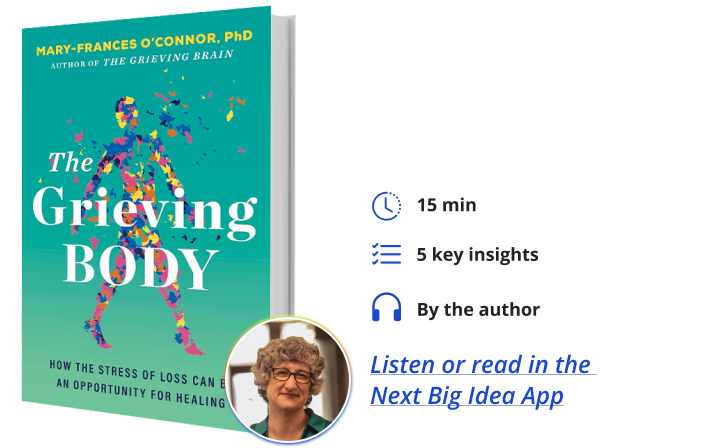Mary-Frances O’Connor is a neuroscientist and clinical psychologist who teaches as a professor of psychology at the University of Arizona, where she also directs the Grief, Loss and Social Stress (GLASS) Lab. She has spent 25 years researching how our cardiovascular and immune systems respond during bereavement. Her book The Grieving Brain was included in Oprah’s list of Best Books to Comfort a Grieving Friend.
What’s the big idea?
When a loved one is amputated from our lives, our physiology changes to the detriment of our own bodily health. Beyond the initial stress response of bereavement, poor coping strategies over loss can harm the body too. This period of increased medical risk begs of us to remember to take care of ourselves and learn better mourning strategies so that we can one day have a meaningful life built around grief.
Below, Mary-Frances shares five key insights from her new book, The Grieving Body: How the Stress of Loss Can Be an Opportunity for Healing. Listen to the audio version—read by Mary-Frances herself—in the Next Big Idea App.

1. Grief is not a disease, but grief is a bodily response as well as an emotional one.
Grief is the natural, normal response to the death of a loved one. But grief happens in the body as well as in the mind. By analogy, pregnancy is also not a disease, but we all recognize it as a period of increased medical risk and encourage screening for hypertension and gestational diabetes.
During bereavement, blood pressure and heart rate tend to increase, which can put stress on our heart. Grief emerges as waves of intense sadness and yearning, but it also upsets the regulation of our physiological systems, which can lead to difficulty with sleep and appetite. Our physiology changes when a loved one is amputated from our lives.
2. We really can die of a broken heart.
Studies of over a million people have shown that bereaved people have higher rates of heart attack and stroke. Widowers are nearly twice as likely to die in the first three months following the death of their spouse as those who are married for the same period.
“Our physiology changes when a loved one is amputated from our lives.”
We see examples of this epidemiological data in highly publicized stories of heartbreak, like the recent deaths of both parents of comedian Conan O’Brien, who died three days apart in December 2024. Dying of a broken heart is clearly visible in big, population-level data.
3. Bereavement is the time to get a regular medical check-up.
Along with blood pressure, inflammation and cortisol (our stress hormone) increase somewhat. Most of us return to our baseline levels in the first six months to a year after our loved one dies, but during this stressful time, we are at increased risk for medical problems. Our regular doctor or nurse practitioner visit can detect hypertension. Our regular dental cleaning can reveal gum disease. Getting a flu vaccine is even more important for our struggling immune system. When we have been caring for a terminally ill loved one, often our focus has been entirely on their health, appointments, and tests, and not on our own.
During bereavement, the challenge is remembering to care for our own grieving body at a time when it may be difficult to do much at all. This time of mourning may be longer and harder than we could ever have anticipated, but we can find patterns in our response.
4. Protest and despair are common responses to loss.
In animals and humans, in all creatures that create attachment bonds, protest and despair are common responses to loss. Protest is the panicky, “Oh no, they’re gone?!?” and despair has all the heaviness of “Oh no . . . they’re gone . . .” You can sense how physical each of those responses is, and how completely different they are from one another, along with the accompanying thoughts.
Protest comes with anger and blame, irrationally motivating us to find them, to wail loudly so they can find us. Despair comes with depressed mood and lack of motivation to see anyone or do anything, to withdraw because of the equally irrational belief that nothing will ever change. And yet, despair is the giving up that resolves the agitation of protest, because protest is extremely costly for our body’s energy budget. Despair is not the end of the story, however, because despair excludes the hope that we could one day have a meaningful life built around our grief.
“Despair is not the end of the story.”
We can develop new ways to cope with these natural responses of protest and despair. Often bereavement takes a toll on our health not just because of our initial stress response, but rather because our coping strategies are not good for us—like using substances or overworking to shut off our mind. We can develop habits that support grieving like a cast supporting a broken bone.
Protest and despair are not just responses to death, but to many kinds of loss. The loss of health, the loss of a job, or the loss of a certain future are also met with protest and despair. In my own life, diagnosis with multiple sclerosis led to cycles of protest and despair, overworking to “prove” I could still do anything I set my mind to, and despair over the ultimately fragile nature of human bodies. I went from pinballing through my life to developing strategies of responsiveness instead of reactivity, and loving kindness for myself and others.
5. Honor what a loved one’s absence means in your body.
When we bond with someone, an “us” is created, a dynamic system of orbiting bodies. That system is ripped apart when our loved one dies, and many people feel physical symptoms as a result. If we have the courage to sit and listen to our body as we would listen to a sorrowful and wordless child, we may come to learn how our body responds to unbearable loss, and how our distinctive way of being in the world initiates our body’s stress response.
Perhaps grieving enables us to understand and honor what the death of our one-and-only really means—for some, the surprising, embodied experience of feeling unsteady on our feet or feeling pain in our heart. Perhaps only then can we truly learn to comfort ourselves and ask for kindness from others, strengthening our ties with living loved ones and connecting with others who have loved, and grieved.
To listen to the audio version read by author Mary-Frances O’Connor, download the Next Big Idea App today:
































